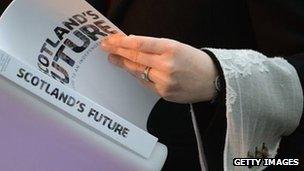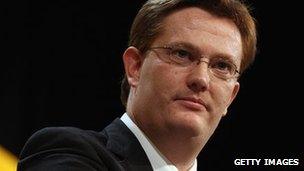Scottish independence: Treasury claims '£1.6bn funding gap' in White Paper
- Published

The Scottish government's White Paper on independence was published last month
An independent Scotland would need to find an extra £1.6bn a year to pay for policies such as free childcare, according to the UK government.
Treasury analysis of the Scottish government's White Paper, external alleges the "unfunded" initiatives would lead to tax rises or spending cuts.
The chief secretary to the Treasury said the Scottish government could not "spend what it will not have".
Scottish ministers said the Treasury's figures were "all over the place".
Both Finance Secretary John Swinney and Deputy First Minister Nicola Sturgeon said the positive side of an independent Scotland was being ignored.
Mr Swinney told BBC Radio Scotland's Good Morning Scotland programme: "The no campaign's numbers are all over the place.
"If we go back to September, they were alleging a £32bn black hole in the finances of an independent Scotland. That came down in November to £10bn and we have now got a claim of £1.6bn.
"When you look at the Treasury analysis there is no account taken of the positive impact on the economy of any of the measures we have set out to boost growth within the Scottish economy."
The White Paper on independence, which was launched last month by First Minister Alex Salmond and Deputy First Minister Nicola Sturgeon, contained a number of key policy commitments, including:
Provision of 1,140 hours per year of childcare to all children from one year old to school age, to be phased in during the first two parliaments of an independent Scotland
a cut in air passenger duty of 50%
corporation tax to be reduced by up to three percentage points
According to the UK Treasury, these three policies would cost £1bn a year by the end of the first parliament, and £1.6bn a year by the end of the second parliament - comparable to the annual cost of Scotland's entire police and fire services.
This does not include costs associated with other policy commitments contained in the document, including returning the Royal Mail to public ownership and increasing the National Insurance employment allowance, said the Treasury.
The row comes as the prime minister said reform of the Barnett formula was "not on the horizon".
In response to a letter from Mr Salmond asking about the implications of a "No" vote in next year's referendum on Scotland's finances, David Cameron wrote: ''Your request for guarantees in perpetuity about the future is quite astonishing; I can no more bind future UK governments than you can bind future Scottish governments.
"What I can say is that reform of the Barnett formula is not on the horizon.
"Indeed, the only immediate threat to Scotland's funding is a vote for independence."
Voters in Scotland will go to the polls on 18 September 2014, and will be asked the "yes/no" question: "Should Scotland be an independent country?"
'Dynamic impact'
Chief Secretary to the Treasury Danny Alexander told Good Morning Scotland: "This analysis takes exactly the same methodology that I would use in the Treasury if a department came to me and said 'we've got some plans to spend some more money, how should we cost it?'
"It is the same methodology we would use every year in our budget statement and so on."

Danny Alexander said the White Paper contained "unfunded promises"
Mr Alexander added: "It is quite striking that in the Scottish government White Paper, that they only offered costings for one year of an independent Scotland.
"Independence is for life, it is not just for one year."
However, Mr Swinney said that public finances in Scotland had been stronger than the UK "to the tune of £12.6bn".
He accused the Scottish government of looking at one side of the equation and not looking at the positive side of the economy in the event of independence.